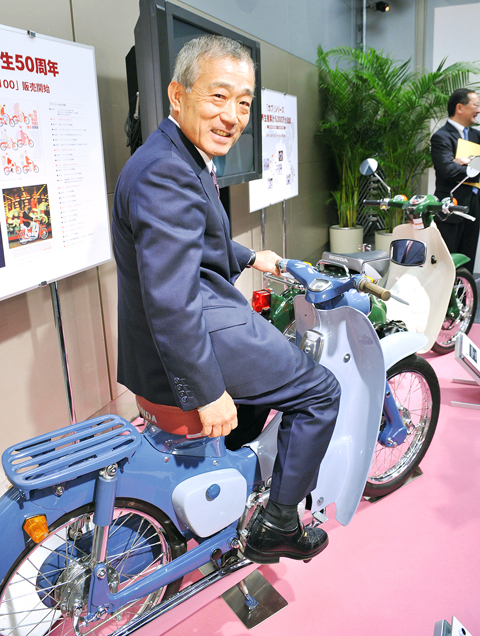Honda Motor said yesterday it would spend US$1.5 billion on two new plants in Japan as it steps up production of fuel-efficient cars, including a new low-cost hybrid scheduled to be launched early next year.
Japan's second-largest automaker will build a plant making fuel efficient engines next year and a new manufacturing plant in 2010, Honda Motor president Takeo Fukui told a press conference.
Honda confirmed it was on track to introduce a low-cost gasoline-electric hybrid next year. It is aiming for initial annual sales of 200,000 of the compact five-door passenger size car.

PHOTO: AFP
Honda also plans to introduce a hybrid version of its Fit compact car along with a new sports hybrid and a new gasoline-electric version of its Civic.
It is aiming for total sales of the four models of 500,000 vehicles a year by the middle of 2010, Fukui said.
“What’s important is to shift the status of hybrid cars from the current image-oriented stage to the new stage [of] full-scale penetration” of the overall market, he said.
Along with its main rival Toyota Motor Corp, Honda is a pioneer of hybrid-engine cars, which save fuel costs and are attracting growing interest at a time of soaring oil prices.
However, the cars are still more expensive than conventional cars and represent just a small share of the total vehicle market.
Honda aims to reduce the premium customers have to pay for a hybrid to about ¥200,000 (US$1,800), from as much as ¥500,000, Fukui said.
“If we could shrink the price gap to less than ¥200,000, then hybrids can compete with conventional cars” based on their lower fuel consumption, Fukui said.

Rainfall is expected to become more widespread and persistent across central and southern Taiwan over the next few days, with the effects of the weather patterns becoming most prominent between last night and tomorrow, the Central Weather Administration (CWA) said yesterday. Independent meteorologist Daniel Wu (吳德榮) said that based on the latest forecast models of the combination of a low-pressure system and southwesterly winds, rainfall and flooding are expected to continue in central and southern Taiwan from today to Sunday. The CWA also warned of flash floods, thunder and lightning, and strong gusts in these areas, as well as landslides and fallen

WAITING GAME: The US has so far only offered a ‘best rate tariff,’ which officials assume is about 15 percent, the same as Japan, a person familiar with the matter said Taiwan and the US have completed “technical consultations” regarding tariffs and a finalized rate is expected to be released soon, Executive Yuan spokeswoman Michelle Lee (李慧芝) told a news conference yesterday, as a 90-day pause on US President Donald Trump’s “reciprocal” tariffs is set to expire today. The two countries have reached a “certain degree of consensus” on issues such as tariffs, nontariff trade barriers, trade facilitation, supply chain resilience and economic security, Lee said. They also discussed opportunities for cooperation, investment and procurement, she said. A joint statement is still being negotiated and would be released once the US government has made

SOUTH CHINA SEA? The Philippine president spoke of adding more classrooms and power plants, while skipping tensions with China over disputed areas Philippine President Ferdinand Marcos Jr yesterday blasted “useless and crumbling” flood control projects in a state of the nation address that focused on domestic issues after a months-long feud with his vice president. Addressing a joint session of congress after days of rain that left at least 31 dead, Marcos repeated his recent warning that the nation faced a climate change-driven “new normal,” while pledging to investigate publicly funded projects that had failed. “Let’s not pretend, the people know that these projects can breed corruption. Kickbacks ... for the boys,” he said, citing houses that were “swept away” by the floods. “Someone has

‘CRUDE’: The potential countermeasure is in response to South Africa renaming Taiwan’s representative offices and the insistence that it move out of Pretoria Taiwan is considering banning exports of semiconductors to South Africa after the latter unilaterally downgraded and changed the names of Taiwan’s two representative offices, the Ministry of Foreign Affairs (MOFA) said yesterday. On Monday last week, the South African Department of International Relations and Cooperation unilaterally released a statement saying that, as of April 1, the Taipei Liaison Offices in Pretoria and Cape Town had been renamed the “Taipei Commercial Office in Johannesburg” and the “Taipei Commercial Office in Cape Town.” Citing UN General Assembly Resolution 2758, it said that South Africa “recognizes the People’s Republic of China (PRC) as the sole